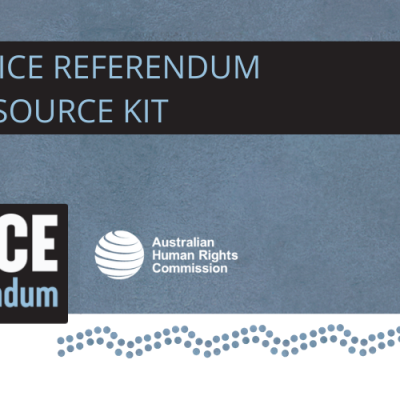Refine results
-
Aboriginal and Torres Strait Islander Social Justice31 July 2023Webpage

Voice Referendum: Understanding the referendum from a human rights perspective
The Commission has produced a resource kit to encourage the Australian public to consider the Uluru Statement from the Heart and the Indigenous Voice to Parliament referendum through a human rights lens. The resources seek to minimise harm by encouraging cultural humility and focusing the conversation on human rights principles as they relate to the referendum and proposed Voice to Parliament. -
Disability Rights17 November 2015Publication
Info and Communications Technology in the A.P.S – the need for change
April 2015 Table of Contents 1 Introduction 2 What do we mean by accessible ICT? 3 The case for accessible ICT 4 Legal dimensions 5 International Experience 6 Procurement of ICT in the APS to-date 7 The way forward 8 Appendix – Private Sector Examples The Australian Human Rights Commission would like to acknowledge the contribution of Ms Lauren Henley, Policy Officer at the Commission… -
Race Discrimination24 October 2023Event
Racism in Sport - Kep Enderby Memorial Lecture 2023
Join hundreds of people around the country as we gather with experts to discuss one of the most pressing issues of our time: "Racism in Sport." This webinar comes in response to the continued struggles faced by those harmed by racism in the world of sports and builds upon decades of advocacy by the Commission. -
Rights and Freedoms10 April 2015Book page
3 Key national priorities, initiatives and commitments
The Commission is an ‘A status’ national human rights institution established and operating in full compliance with the Paris Principles. The sufficiency of funding and staffing for the Commission was called into question during Australia’s UPR. ACHRA encourages the Australian Government, through the regular federal budget process, to ensure the Commission continues to operate as an… -
14 December 2012Book page
Introduction - Social Justice Report 2010
Social Justice Report 2010 Back to Contents Introduction Recommendations Introduction It is with great pleasure that I present my first Social Justice Report (the Report) as the Aboriginal and Torres Strait Islander Social Justice Commissioner, having commenced my five-year term on 1 February 2010. I write this Report as a Gangulu man from Central Queensland with over 25 years of experience … -
Sex Discrimination1 July 2020Opinion piece
Sexual harassment is prevalent across all industries and sectors. We can and must stop it
Sexual harassment is prevalent across all industries and sectors. We can and must stop it. -
14 December 2012Book page
Social Justice Report 2005 : Appendix 1 : Chronology of events relating to the new arrangements for the administration of Indigenous affairs, 1 July 2004 - 30 June 2005
Social Justice Report 2005 Appendix 1 : Chronology of events relating to the new arrangements for the administration of Indigenous affairs, 1 July 2004 – 30 June 2005 back to contents Download PDF version of Appendix 1 (778 KB) This Appendix provides an overview of main events since the introduction of the new arrangements for the administration of Indigenous affairs on 1 July 2004. It… -
14 December 2012Book page
HREOC - Annual Report 2001 - 2002: Statement from the President
The Human Rights and Equal Opportunity Commission occupies a unique place in Australian society. It sits independent of Government, yet it is not what is traditionally known as a non-government organisation (NGO) or an advocate. -
14 December 2012Book page
Native Title Report 2002: Summary of the Validation & Confirmation of Extinguishment Provisions in the NTA
In the High Court’s formulation of native title in Mabo (No 2), [1] delivered on 3 June 1992, it was made clear that in the past, governments could validly grant interests in land that would extinguish native title. These grants could be made without payment of compensation to native title holders. [2] At least that was as far as the common law was concerned. The Court did not need to… -
14 December 2012Book page
A last resort? - Summary Guide: The facts about immigration detention in Australia
Since 1992, Australia's migration law has made it mandatory for any person in Australia without a valid visa to be detained until they are issued with a visa or removed from Australia. This law applies equally to adults and children.
